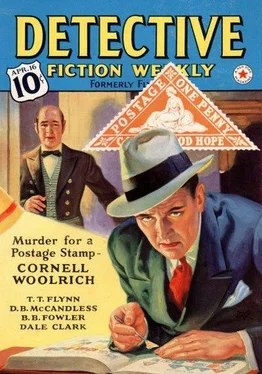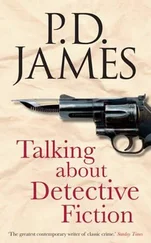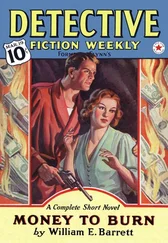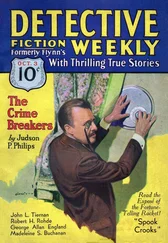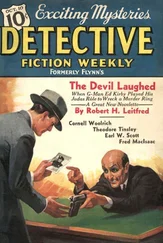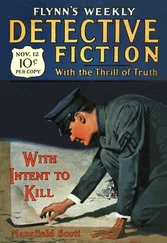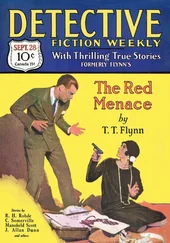Лоуренс Трит - Detective Fiction Weekly. Vol. 118, No. 6, April 16, 1938
Здесь есть возможность читать онлайн «Лоуренс Трит - Detective Fiction Weekly. Vol. 118, No. 6, April 16, 1938» весь текст электронной книги совершенно бесплатно (целиком полную версию без сокращений). В некоторых случаях можно слушать аудио, скачать через торрент в формате fb2 и присутствует краткое содержание. Город: New York, Год выпуска: 1938, Издательство: The Red Star News Company, Жанр: Детектив, на английском языке. Описание произведения, (предисловие) а так же отзывы посетителей доступны на портале библиотеки ЛибКат.
- Название:Detective Fiction Weekly. Vol. 118, No. 6, April 16, 1938
- Автор:
- Издательство:The Red Star News Company
- Жанр:
- Год:1938
- Город:New York
- ISBN:нет данных
- Рейтинг книги:3 / 5. Голосов: 1
-
Избранное:Добавить в избранное
- Отзывы:
-
Ваша оценка:
- 60
- 1
- 2
- 3
- 4
- 5
Detective Fiction Weekly. Vol. 118, No. 6, April 16, 1938: краткое содержание, описание и аннотация
Предлагаем к чтению аннотацию, описание, краткое содержание или предисловие (зависит от того, что написал сам автор книги «Detective Fiction Weekly. Vol. 118, No. 6, April 16, 1938»). Если вы не нашли необходимую информацию о книге — напишите в комментариях, мы постараемся отыскать её.
Detective Fiction Weekly. Vol. 118, No. 6, April 16, 1938 — читать онлайн бесплатно полную книгу (весь текст) целиком
Ниже представлен текст книги, разбитый по страницам. Система сохранения места последней прочитанной страницы, позволяет с удобством читать онлайн бесплатно книгу «Detective Fiction Weekly. Vol. 118, No. 6, April 16, 1938», без необходимости каждый раз заново искать на чём Вы остановились. Поставьте закладку, и сможете в любой момент перейти на страницу, на которой закончили чтение.
Интервал:
Закладка:
“If you’ll glance behind you at that ticker you’ll see the reason.”
Lindquist did so briefly, but spread his hands at shoulder level. “Greek to me,” he said.
Hobart had gotten up with forced steadiness, was drawing water from the cooler into a paper container.
Lindquist was laughing puckishly. “Naturally, I don’t blame you for being on your guard, after the way you were taken in yourself by that very stamp once. The burnt child shuns the fire.”
“So you know that too?” Hobart didn’t get pale this time, or betray himself in any way. The first shock had insulated him against the second. Watching the water bubble into the cup he was holding, he said to himself stonily: “This man must die. He sold Harding the genuine triangular. He remembers reading in the papers at the time that I was swindled with a forgery.” Aloud he asked with careful steadiness: “Have you seen the Harding collection yet?” But obviously Lindquist hadn’t, or he would already have raised the alarm about the substitution.
“No, but I have an appointment with Inspector Foster to look it over tomorrow. I can’t, of course, buy anything until the estate has been probated, but I’m hoping to be able to get an option, first claim on this triangular, from Mrs. Adams, and put one over on my competitors in that way.”
Hobart said, “Why don’t you come out and dine with me at my house tonight? I’ll show you my collection.” And inwardly, “If you live long enough to get there.”
“Splendid, splendid!” the enthusiastic little connoisseur burst out. “I’m at the Harrison Hotel. Very kind of you indeed! And now I won’t take up any more of your time.”
“I’ll call for you at six sharp and drive you out.” As the frosted-glass panel closed after his caller, Hobart slumped back behind the desk and held his head in both hands. “He’s got to be put out of the way,” he said to himself.
It wasn’t revelation of the theft that worried him now any more. He was realizing he had put himself into a position where he would almost certainly be charged with the murder itself. After all, how could he prove that he had taken it the night he had, and not two nights before, the night Harding had been killed? He had stayed in his den that whole night going over his stamps. Nobody had seen him, could vouch for him, but his servant — and a single unsupported corroboration like that was too shaky to count on...
Yes, he would have to commit a murder, with all deliberation, as the only way of escaping being charged with one. One he had had nothing to do with.
He switched on his inter-office loudspeaker, snapped, “I’m not in to anyone for the rest of the day, understand?”
Tracing imaginary lines on his glass-topped desk with a gold pencil, he said to himself: “There are two ways out to my place from the Harrison Hotel, downtown. One is the short way, with traffic lights to guarantee its safety. One is the long roundabout route, that crosses the railroad right-of-way twice. He’s a stranger here. He won’t know the difference. The Flyer shoots through those right-of-ways at about 6:10 every night, for the East. If something should happen to the car, and it stalled on the crossing, I’d have time to jump for it — if I knew ahead of time — but would he?”
He bounced the gold pencil on the glass. “That’s it!” he exulted. He was a business man, quick to make decisions. Only this time the business was death.
VI
At five to six, in a dark backstreet behind the Harrison Hold, he stopped his car, got out, took a wrench from the tool kit and carried it around to the front door on the right hand side. He glanced around him, but in the twilight, in this section of factories and warehouses, there was no one in sight. He began swinging the wrench like a short-tempered man who has been trying to repair something and finally loses control of himself. The blows bent the outside door-handle down at such an angle to the face of the door that it became impossible to turn it, even from the inside. Then he flattened the latch-grip on the inside, so that even thin fingers couldn’t work under it to get a grip on it. The door beside the guest seat was now jammed immovably for all practical purposes. One could still open it, with patience and dexterity, yes, but not in an emergency, under stress of excitement or extreme fright.
Five minutes later, around the corner from there, he was leading Lindquist toward the car wider the lighted hotel-marquee, all sociability. Murray Hobart could be agreeable when he wanted to.
“You’ll have to get in from that side and squeeze through under the wheel,” he apologized. “A truck grazed me coming down and jammed that door fast.”
“Too bad,” sympathized Lindquist.
(“You’ll find out how to-bad it is,” Hobart thought.)
He noted with satisfaction the difficulty the rotund little connoisseur had in clearing the steering wheel shaft with his convex shape and short little legs. When he had, he was jammed into a corner pocket from which the only possible escape lay in vaulting over the top of the door. He was neither of a build nor agility to make this feasible. And it was going to come up on this side, from their right; that meant the dazzle of the headlight would blind him. And the natural instinct would be to get away from it, not jump out toward it. That meant the wheel shaft would trap him.
“Do you drive, Mr. Lindquist?” Hobart asked, to make conversation as they started off.
“No, strangely enough I’ve never taken it up.”
Hobart glanced at his watch. A minute past six. It had better happen at the first crossing, otherwise the Flyer might go by before they reached the second. Six-ten o’clock for the first, and about a quarter past for the second.
He held his car to a steady forty going down the shabby warehouse-lined road, that had neither traffic officers nor lights nor carried any private traffic, and that drew away from the direction of his own house at nearly a right angle, only to loop around again later. Forty was just about right — would get them there neither too soon nor too late. And since Lindquist didn’t drive, he wouldn’t be able to recognize the engine trouble, when it came, for the fake it was.
“How simple it is to kill another man,” thought Hobart philosophically.
He started to talk about stamps again, to keep Lindquist’s mind occupied. He was that kind of a man. He could talk shop to the man beside him while he was in the very act of driving him to his death.
He said, eyes on a tiny green pea ahead that marked the railroad crossing, “My own collection is no slouch, if I must say so myself. I’ve been collecting about eighteen years now.”
“Nothing like it, is there?” agreed Lindquist heartily.
Ahead, the green pea at the point of perspective of the broad gloomy vista had swollen to the size of a grape now, a green Malaga grape hanging there in mid-air.
Hobart glanced at his watch. Six-eight. They’d just get there in time for the funeral. One band left the wheel, came idly to rest on the door latch next to him, in readiness for his own imminent bolt.
Lindquist had gone on chattering blithely about the Harding collection. “I bet if it were appraised it would come to a cool half million. Why, his early British colonials alone—”
He bit the sentence off short. Left it hanging in mid-air as though it had been cut by a knife. Hobart stiffened and the bristles on the back of his neck stood up. He’d seen the collection, this man next to him! Not the fact that he had admitted knowledge of the British colonials (for in the guise of stamp dealer he could have supplied them to Harding and therefore known they were in the collection), but the way he had guiltily stopped short in mid-sentence, choked on what he was saying, gave him away. He had already seen the collection, and yet he had said in the office this afternoon that he hadn’t. That could only mean one thing. He was no stamp expert. At least not the innocent, casual looker-in at Hobart’s office that he pretended to be. He was a decoy, a police spy, a stool-pigeon! He had been employed by Foster to get the goods on him, Hobart. That meant he was already under suspicion, they had their eyes on him.
Читать дальшеИнтервал:
Закладка:
Похожие книги на «Detective Fiction Weekly. Vol. 118, No. 6, April 16, 1938»
Представляем Вашему вниманию похожие книги на «Detective Fiction Weekly. Vol. 118, No. 6, April 16, 1938» списком для выбора. Мы отобрали схожую по названию и смыслу литературу в надежде предоставить читателям больше вариантов отыскать новые, интересные, ещё непрочитанные произведения.
Обсуждение, отзывы о книге «Detective Fiction Weekly. Vol. 118, No. 6, April 16, 1938» и просто собственные мнения читателей. Оставьте ваши комментарии, напишите, что Вы думаете о произведении, его смысле или главных героях. Укажите что конкретно понравилось, а что нет, и почему Вы так считаете.
